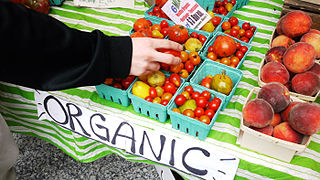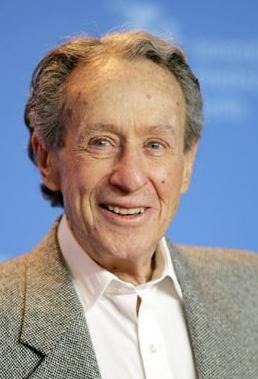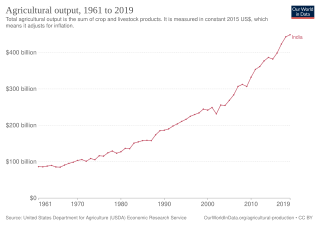
Jessica Phyllis Lange is an American actress. Known for her roles on stage and screen she has received numerous accolades and is one of the few performers to achieve the Triple Crown of Acting. Lange has received two Academy Awards, three Primetime Emmy Awards, five Golden Globe Awards, and a Tony Award as well as nominations for a BAFTA Award and a Olivier Award.
Organic farming, also known as organic agriculture or ecological farming or biological farming, is an agricultural system that uses fertilizers of organic origin such as compost manure, green manure, and bone meal and places emphasis on techniques such as crop rotation and companion planting. It originated early in the 20th century in reaction to rapidly changing farming practices. Indeed, so-called "organic pioneers" wanted to keep farming with nature, without being dependent on external inputs. Certified organic agriculture accounts for 70 million hectares globally, with over half of that total in Australia. Biological pest control, mixed cropping, and the fostering of insect predators are encouraged. Organic standards are designed to allow the use of naturally-occurring substances while prohibiting or severely limiting synthetic substances. For instance, naturally-occurring pesticides such as garlic extract, bicarbonate of soda, or pyrethrin which is found naturally in the Chrysanthemum flower are permitted, while synthetic fertilizers and pesticides such as glyphosate are prohibited. Synthetic substances that are allowed, only in exceptional circumstances, include, for example, copper sulfate, elemental sulfur, and veterinary drugs. Genetically modified organisms, nanomaterials, human sewage sludge, plant growth regulators, hormones, and antibiotic use in livestock husbandry are prohibited. Organic farming positively impacts sustainability, self-sufficiency, autonomy and independence, health, animal welfare, food security, and food safety. Organic farming can therefore be seen as part of the solution to the impacts of climate change, as also established by the Food and Agriculture Organisation (FAO).

Frances is a 1982 American biographical tragedy film directed by Graeme Clifford and written by Eric Bergren, Christopher De Vore, and Nicholas Kazan. The film stars Jessica Lange as Frances Farmer, a troubled actress during the 1930s whose career suffered as a result of her mental illness. It also features Kim Stanley, Sam Shepard, Bart Burns, Christopher Pennock, Jonathan Banks, and Jeffrey DeMunn in supporting roles. The film chronicles Farmer's life from her days as a high school student, her turbulent relationship with her emotionally abusive mother, her short lived film career in the 1930s, her institutionalization for alleged mental illness in the 1940s, her deinstitutionalization in the 1950s and her appearance on This Is Your Life.

The organic movement broadly refers to the organizations and individuals involved worldwide in the promotion of organic food and other organic products. It started during the first half of the 20th century, when modern large-scale agricultural practices began to appear.

Arthur Hiller Penn was an American filmmaker, theatre director, and producer. He was a Tony Award winner, and was nominated for three Academy Awards for Best Director, as well as a BAFTA Award, a Golden Globe, two Primetime Emmys. As a member of the New Hollywood movement, Penn directed several critically-acclaimed films dealing with countercultural issues of the late 1960s and 1970s, notably the drama The Chase (1966), the biographical crime film Bonnie and Clyde (1967), the comedy Alice's Restaurant (1969), and the revisionist Western Little Big Man (1970).

The history of agriculture in India dates back to the Neolithic period. India ranks second worldwide in farm outputs. As per the Indian economic survey 2020 -21, agriculture employed more than 50% of the Indian workforce and contributed 20.2% to the country's GDP.
William Charles "Bill" Kloefkorn, was a Nebraska poet and educator based in Lincoln, Nebraska. He was the author of twelve collections of poetry, two short story collections, a collection of children's Christmas stories, and four memoirs. Additionally Kloefkorn was professor of English from 1962 to his retirement in 1997 to professor emeritus of English at Nebraska Wesleyan University.

Annette M. Dubas is a politician from the U.S. state of Nebraska, who served in the Nebraska Legislature from 2007 to 2015. She was a candidate in the 2014 Nebraska gubernatorial election, but withdrew in November 2013.
Stephanie Grace Whitson is an American writer of historical fiction. A native of southern Illinois, she has lived in Nebraska, United States, since 1975. She began what she calls "playing with imaginary friends" when, as a result of teaching her four homeschooled children Nebraska history, she was encouraged and challenged by the lives of pioneer women in the West.

June Louise Squibb is an American actress. She began her career by making her Broadway debut in the musical Gypsy (1959). Her first film role was in the 1990 romantic comedy Alice by Woody Allen. She later had supporting roles in the films The Age of Innocence (1993), In & Out (1997), Meet Joe Black (1998), About Schmidt (2002), and Far from Heaven (2002).

73 Cows is a 2018 documentary short about Jay and Katja Wilde, farmers in England who gave their herd of beef cows to the Hillside Animal Sanctuary and took up vegan organic farming. It was directed and produced by Alex Lockwood. In 2019, it won the BAFTA Award for Best Short Film at the 72nd British Academy Film Awards.

Joshua Becker is an American author, writer, and philanthropist.
Will Bonsall is an American author, seed saver and veganic farmer who lives in Maine. He is a regular speaker about seed saving, organic farming and veganic farming.
Stephanie Johanns is an American politician and businessperson. She is a former first lady of Nebraska and member of the Nebraska Legislature. Johanns was a county commissioner for Lancaster County.

OutNebraska is a Nebraska statewide LGBTQ advocacy, lobbying, and community organization.
Fred Kirschenmann is an American professor, organic farmer, and a leader in the sustainable agriculture movement. He is board president of Stone Barns Center for Food and Agriculture and the former director of the Leopold Center for Sustainable Agriculture. He is considered "one of the most prominent spokesmen for the sustainable farming movement."
David Vetter is an organic farmer and leader in the sustainable agriculture movement.
The 2017 Lincoln Nebraska Women's March was a political demonstration of approximately 3,000 to 4,000 women in Lincoln, Nebraska. It took place on January 21, 2017, the day after the inauguration of President Donald Trump. The Lincoln march was part of a larger movement of anti-Trump women's marches that happened across the United States.
Nebraska State Hospital, also known as the Nebraska Asylum for the Insane, the Lincoln State Hospital and the Lincoln Regional Center was an insane asylum established near Lincoln, Nebraska in 1870. Due to the understanding of mental health in the late 19th and early 20th centuries, the facility treated everything from alcoholism to epilepsy and syphilis. Among its former staff is Agnes Richards, who went on to establish the Rockhaven Sanitarium.

Judi M. gaiashkibos is a Ponca-Santee administrator, who has been the executive director of the Nebraska Commission on Indian Affairs since 1995. According to journalist John Mabry, her surname "is pronounced 'gosh-key-bosh' and spelled without a capital in recognition "that the two-legged are not superior to the four". She is an enrolled member of the Ponca Tribe of Nebraska.











